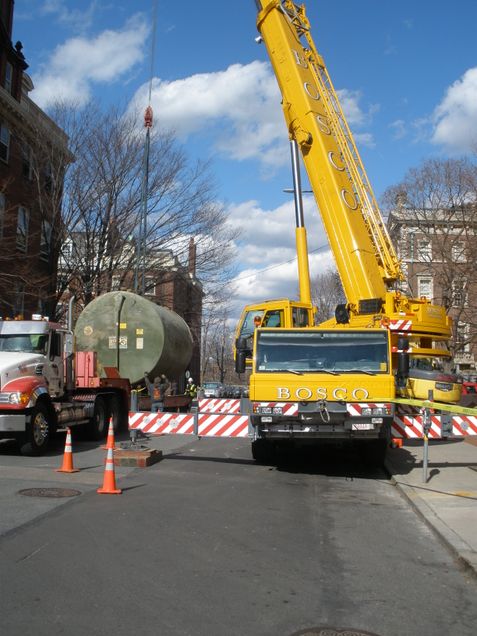Underground Oil Tanks Being Removed
Underground oil tanks across campus are being removed as building heating systems convert from oil to gas.
Removing underground oil tanks not only allows the University to burn a more efficient, less costly energy source, it also removes any potential environmental concerns. Originally, the primary heating source for almost every building on campus was oil. Newer facilities such as the School of Management, Agganis Arena, FitRec, and the Student Village were built to burn gas, which is cheaper and more environmentally friendly. Older buildings that were built to burn oil are all being carefully evaluated for conversion to burn gas. Most of these buildings were equipped with above ground oil tanks, but at its peak there were 14 in-ground or underground oil tanks on campus, some of which held thousands of gallons of fuel oil. Many had outlived their designed lives and corrosion that accompanies bare steel tanks was taking its toll. Two underground tanks were removed a few years ago, five were removed last summer, and plans are underway to remove another four this summer leaving only three underground tanks on campus after the semester starts in the fall.
 As the University removes old underground oil tanks, precautions are taken to ensure the environment is safe, that nothing leaked from the old container, and that the container is disposed in an appropriate manner prescribed by state and federal authorities. The University retains a licensed site professional engineer to validate and oversee this process. Once it’s removed from the ground, the tank is thoroughly cleaned and disposed of at a recycling or scrap metal facility. Soil samples are then taken from the area around which the tank once occupied to ensure that no oil broke through the container’s steel structure.
As the University removes old underground oil tanks, precautions are taken to ensure the environment is safe, that nothing leaked from the old container, and that the container is disposed in an appropriate manner prescribed by state and federal authorities. The University retains a licensed site professional engineer to validate and oversee this process. Once it’s removed from the ground, the tank is thoroughly cleaned and disposed of at a recycling or scrap metal facility. Soil samples are then taken from the area around which the tank once occupied to ensure that no oil broke through the container’s steel structure.
The three underground tanks that will remain in service at Boston University have had their single walled containers replaced with double walled tanks equipped with alarms that are monitored 24X7. Should some unfortunate incident happen in which oil breaks the seal of the first tank, an alarm will notify the appropriate authorities, thereby mitigating any potential damage that could be made to the environment.
